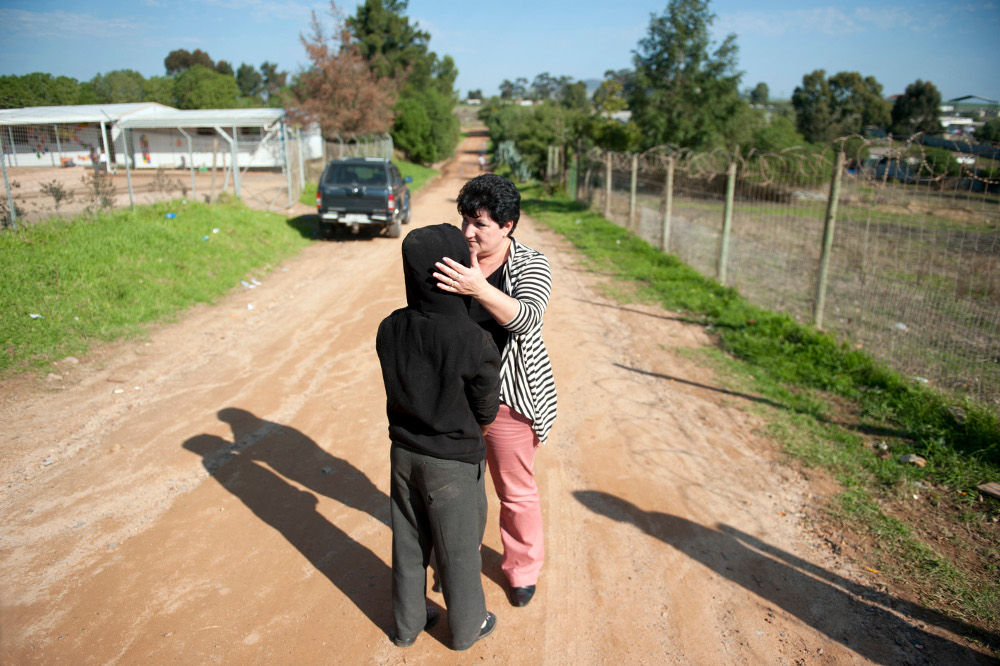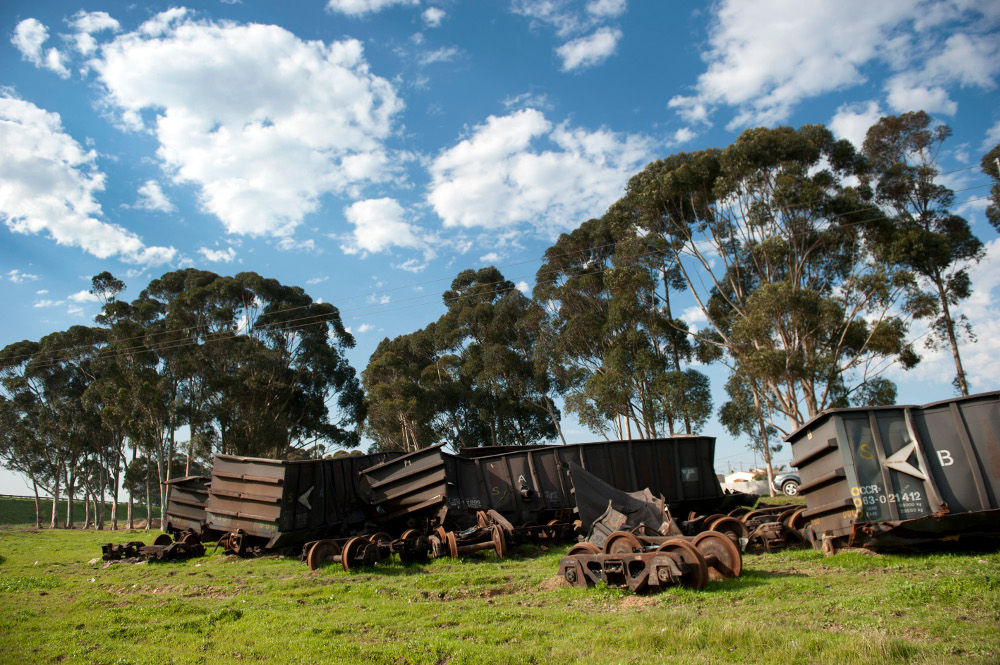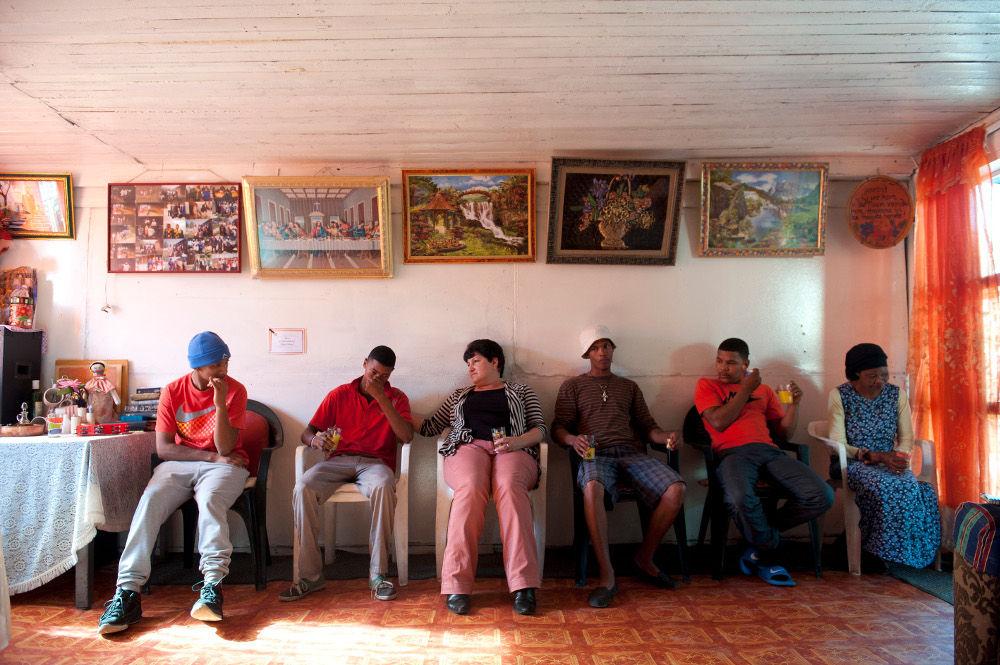Frikkie Bosse demonstrates technical moves with the help of Marno Plaatjies at the Olympians gym in Durbanville. The Bosses have introduced wrestling to a number of communities.
Like many sporting clubs 10 years ago, the Olympians Wrestling Club of Durbanville in Cape Town’s northern suburbs faced a precarious future. Wrestling was a marginal sport from a bygone era when strong men in tight singlets tagged against each other in mute ardour.
There was no money in the sport and, because there was no television exposure, there was no sponsorship. Numbers were dwindling. Wrestling was, to coin a phrase, facing its own pin fall.
Into this scenario stepped Frikkie and Wendy Bosse. Frikkie is the president of the South African Wrestling Federation, and his wife, Wendy, is the Olympians’s heart and soul.
After contracting polio as a child, Frikkie spent a year in a hospital bed deciding not to be a victim. Wrestling provided him with a goal and a future. He is, according to his wife, “a very determined man”.
Wendy doesn’t lack for untapped reservoirs of determination herself. An effervescent workaholic, most days of the week see her and her hard-working black bakkie ploughing down the dirt and tar roads surrounding Durbanville as she quite literally does everything imaginable for wrestling’s new converts. She feeds and fetches, counsels and calms.
Mercy missions
She and Frikkie have run mercy missions into informal settlements to rescue young wrestlers with severe appendicitis, nursing them back to health. One wrestler was so badly burned when a heater overturned in his shack that his tight-fitting T-shirt melted into his skin. His wounds needed to be dressed on a daily basis for months.
Over the years, the Bosse home in Durbanville has become a halfway house. Wrestlers on their way to practise or far-off tournaments often use it as a base camp or simply stop to say hello. “You won’t believe our food bill,” she says. “We can bring in three loaves of bread in the morning and the next day they’re gone. Sometimes the kids are so hungry that they wake up in the middle of the night to eat.”

Wendy Bosse provides emotional support to many of the kids involved in the wrestling programme. (Photos: David Harrison, M&G)
When the Bosses changed the sport’s demographics approximately 10 years ago, venturing into places such as Fisantekraal, Klipheuwel, Morning Star and Philadelphia, they found themselves exposed to a world they hardly knew existed.
Very quickly they discovered they weren’t just evangelists for their chosen sport. Almost immediately they strayed into social development. They became surrogate parents to kids from broken families, providers of meals and soup kitchens.
With the help of a group of facilitators and volunteers they identified a group of “safe houses” where wrestlers could stay safely, away from abusive parents or angry fathers. In every way it was an awakening.
Drugs culture
Talking about the pernicious drugs culture on the flatlands north and east of Durbanville and out towards Malmesbury, where Wendy does most of her outreach, she bemoans the prevalence of dagga, mandrax and crystal meth, also known as “tik”.
“I was the kind of person who thought ‘buttons’ were things you sewed on to jerseys and shirts,” she says with a shy laugh.
All of this outreach, all of these feeding schemes and rehabilitation programmes, would have been useless without meaningful results.

A train wreck near Fisantekraal, allegedly caused by tik addicts who stole part of the railway line for scrap.
Norma Gordon (20) and Marno Plaatjies (21) are two of the club’s finest products and both are heading off to the Commonwealth Games in Glasgow next month, having stumbled into wrestling in unique ways.
“I thought I would do it for a bit of a joke and I just found I really liked it,” says Gordon, a moon-faced, optimistic girl who is studying to be an accountant. She is expecting to win a medal in Scotland.
“I’m only a little strong now,” she says. “Wrestling is a combination of strength and technique. I’m in the gym, working on strength and on a proper diet. Fruit and vegetables. Tuna. Protein. Going to Brazil for the Olympics in two years’ time is my real goal.”
Glint of greatness
With the glint of possible greatness in his eye, Plaatjies is the programme’s big hope. A decent cross-country athlete when he was younger, he was introduced to the sport by a friend. He is widely expected to win a medal in Glasgow, although the savvy Indian wrestlers stand in his way.
“I just don’t like losing,” says Plaatjies, and there is some intangible hint in the way that he says it that makes you believe him. For all of his natural talent, the fact that, according to Wendy, he seemed to be born to wrestle, there are concerns that the Indians might have his number.
He has lost to them in international championships once already and the wrestling community is enlisting the services of a psychologist before the wrestlers leave for a training camp in Hungary shortly.

Wendy comforts a man struggling with addiction in Klipheuwel, at a home that has been turned into a community church.
It will be the psychologist’s job to see to it that the self-belief isn’t just an expression of bravado but wells up strongly from the inside.
Whether Plaatjies or Gordon win medals or not, it is impossible to overstate the magnitude of their achievements. Fisantekraal is no more than a speck on the map, a shantytown that is cold, exposed and wet at this time of year.
Just outside of town, on the railway line north to Malmesbury, adjacent to the R302, lie nine railways goods wagons that jack-knifed off the track one night late last year.
Local legend
Local legend has it that the reason this happened was because the local tik addicts had ripped nuts and bolts off the line, fatefully loosening the track, and sold the scrap to metal dealers, so that they could buy drugs with the proceeds.
The mangled coal-carrying trucks are still there, much like the Fisantekraal community nearby.
But there is hope. Olympians have just secured a 10-year lease from the council for their hall adjacent to the Durbanville racetrack. It means that they have tenure of a kind and can make improvements and extensions.
In 2005 they started with a group of eight to 10 children. That number is now up to 300 wrestlers across the primary schools in the Boland and the club’s several hubs, an oasis of success in an otherwise cruel and indifferent sea.